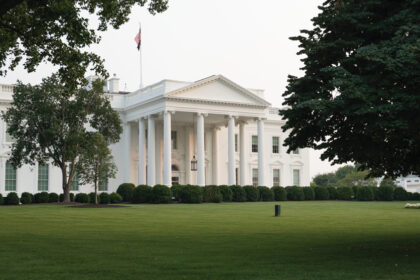
With the dust still settling, I thought I’d wade into a precarious subject because I believe this Presidential election and the outcome were so substantial in what transpired, that humanity will be studying and evolving from it for generations to come. The 2024 season has been a dynamic intersection of ideologies and passions; as such, I would love to challenge everyone to forego emotional opinions, and in recognizing that the White House is about to change such as it is, we explore a positive take on what it might mean for entrepreneurs and innovation. While viewpoints may differ, there are clear and potentially positive signals that suggest a Trump administration could be advantageous to startups.
Notice that what I’m attempting to do first and foremost, is draw your focus away from the President elect. The individuals surrounding his campaign each bring disruptive, entrepreneurial, independent, and reformist, ideas to the table and if these people round out the Cabinet directing the administration for the next four years, founders and investors would do well to start now appreciating the likelihood: an environment that could catalyze startup growth, from easing regulatory challenges to fostering a culture of economic resilience and self-reliance.
Article Highlights
- Tulsi Gabbard: Bridging Independent Thinking with Policy Reform
- JD Vance: Championing Middle America and the Blue-Collar Entrepreneur
- Vivek Ramaswamy: The Entrepreneurial Spirit in Government
- Elon Musk: Technological Optimism and Scaling Innovation
- RFK Jr.: Public Health and the Rise of HealthTech Startups
- Less Directly Involved but Possibly
- Opportunity for the Entrepreneurial Future
Tulsi Gabbard: Bridging Independent Thinking with Policy Reform
Former Democratic congresswoman turned independent, Gabbard has long been an advocate for questioning the status quo. Gabbard brings an unconventional but pragmatic approach to economic policy, having advocated for stricter antitrust enforcement, specifically targeting tech giants who she believes engage in anti-competitive practices. Her influence could foster policy changes that benefit startups by leveling the playing field while a dedication to transparency, accountability, and anti-establishment sentiment resonates with entrepreneurs seeking autonomy in a world dominated by legacy corporations.
Moreover, Gabbard’s bipartisan experience could be instrumental in shaping policies that reduce unnecessary bureaucracy and regulatory barriers — two elements that notoriously slow startup innovation. Her drive to support the “little guy” aligns well with the needs of early-stage businesses and freelancers, who often feel left behind by policy frameworks designed primarily for larger, more established entities.
JD Vance: Championing Middle America and the Blue-Collar Entrepreneur
JD Vance, an author and venture capitalist through Peter Thiel’s Mithril Capital, Revolution, a venture capital firm co-founded by former AOL CEO Steve Case, and his own firm out of Ohio, Narya Capital, brings a fresh perspective that could benefit startup hubs outside traditional regions such as Silicon Valley. Coupled with his advocacy for working-class Americans, Vance reinforces the untapped potential in rural and underserved communities. A White House with his influence should lead to policies that encourage decentralized innovation, thereby creating opportunities for founders across America — not just in major metropolitan areas.
His emphasis on supporting the “real economy” and the manufacturing sector could lead to initiatives that revitalize domestic production. Startups focusing on industrial innovation, sustainability, and local manufacturing may find more support and incentives under this administration. The potential for startups in sectors like clean energy, agriculture, and advanced manufacturing would be promising as Vance’s advocacy works to shift attention back to the backbone of American labor and ingenuity.
Vivek Ramaswamy: The Entrepreneurial Spirit in Government
Vivek Ramaswamy, an entrepreneur and investor, is no stranger to the challenges founders face. Known for his anti-establishment stance and focus on disrupting traditional corporate norms, Ramaswamy could advocate for policies that favor disruptive innovation, lower regulatory hurdles, and even tax incentives tailored to startups. He has previously voiced support for reining in government agencies’ power over businesses, a stance that could simplify the path for new ventures that often struggle with complex regulatory frameworks.
If Ramaswamy’s views, evident in his work in Roivant Sciences, a biopharmaceutical company, or as an investor in BuzzFeed, translate into policy influence, we could see increased support for research and development tax credits, reduced compliance costs for young companies, and a broader encouragement of risk-taking. His presence signals that this administration is open to policies that make entrepreneurship a more accessible path for more people — a positive development for anyone considering starting a business.
Elon Musk: Technological Optimism and Scaling Innovation
Musk’s influence and alignment with certain aspects of Trump’s economic vision could play a notable role in shaping the startup ecosystem. While a controversial figure, Musk’s push for regulatory reform in the transportation and aerospace sectors and his belief in bold innovation resonate with an entrepreneurial mindset that encourages experimentation and calculated risk.
Musk’s own ventures in renewable energy, space exploration, and transportation innovation provide a blueprint for ambitious startups looking to tackle massive problems. His support could lead to initiatives aimed at increasing funding for science and R&D or creating “sandbox” regulatory environments where startups can test innovative concepts with less red tape. Musk’s ethos—where “the impossible” is simply an uncharted path—may inspire the administration to make the U.S. a more hospitable place for pioneering ventures.
RFK Jr.: Public Health and the Rise of HealthTech Startups
Robert F. Kennedy Jr., though politically independent, brings a keen focus on public health, which has broader implications for the health and biotech sectors. With costs and regulatory challenges posing significant hurdles for health-related startups, RFK Jr.’s influence could pave the way for policies that reduce respective barriers to market entry. His focus on transparency and choice in healthcare aligns well with the burgeoning digital health sector, telemedicine, and wellness startups, which thrive in environments where consumers demand better information and accessibility.
Startups innovating in HealthTech, from personalized medicine to digital health apps, may find a more supportive environment under policies inspired by his principles. Let alone his interests aligning with CleanTech and healthy innovation and food, his questioning traditional healthcare approaches would benefit startups by challenging monopolistic practices within the industry, encouraging competition.
Less Directly Involved but Possibly
Marco Rubio: Advocating for Small Business Growth
Senator Marco Rubio has been a vocal supporter of small businesses and entrepreneurship. His legislative efforts have focused on providing access to capital and reducing regulatory burdens for startups. Rubio’s potential involvement could lead to policies that foster a more conducive environment for new ventures.
Doug Burgum: Tech Entrepreneur Turned Governor
North Dakota Governor Doug Burgum, invested in Great Plains Software, becoming its president in 1984, and taking the company public in 1997. Sold the company to Microsoft for $1.1 billion in 2001, Burgum then managed Microsoft Business Solutions. He has served as board chairman for Australian software company Atlassian and SuccessFactors, as well as founding Arthur Ventures, a software venture capital group. His understanding of the challenges startups face positions him to advocate for policies that support innovation. Burgum’s influence could be instrumental in creating a favorable landscape for risks in tech.
Robert Lighthizer: Championing Fair Trade Practices
As the former U.S. Trade Representative, Robert Lighthizer has been a proponent of fair-trade practices that protect American businesses such that his expertise could help ensure that startups have a level playing field in the global market, promoting competitiveness, and growth.
Bill Hagerty: Bridging Business and Government
Senator Bill Hagerty’s background in business and diplomacy provides a unique perspective on fostering public-private partnerships. His approach could facilitate collaborations that benefit startups, particularly in sectors like enterprise hardware and manufacturing.
Kristi Noem: Championing Business-Friendly Policies
South Dakota Governor Kristi Noem has been recognized for her pro-business stance, emphasizing minimal regulations and low taxes. Her approach has fostered an environment conducive to entrepreneurship and innovation, and her involvement could lead to policies that further reduce barriers for startups, encouraging economic growth and job creation.
Tim Scott: Advocating for Economic Empowerment
Senator Tim Scott of South Carolina has been a strong advocate for economic empowerment in underserved communities. His Opportunity Zones initiative aims to stimulate investment in economically distressed areas, providing startups with access to capital and resources. Scott’s influence could promote inclusive growth, ensuring that entrepreneurial opportunities are accessible to a diverse population.
Byron Donalds: Supporting Small Business Development
Representative Byron Donalds of Florida brings a background in finance and a commitment to small business development. He has emphasized the importance of reducing regulatory burdens and increasing access to capital for startups; work that could lead to initiatives that support the growth and sustainability of new ventures, particularly in minority communities.
Ron Paul: Libertarian Economics and Fiscal Responsibility
With Elon Musk’s nod to Ron Paul, we’d be remiss without highlighting the implication of his advice. Ron Paul’s long-standing libertarian views add a critical lens on fiscal policy and limited government, principles that resonate with many entrepreneurs. Known for advocating lower taxes, reduced government spending, and less interventionist policies, Paul’s influence could lead to a more laissez-faire approach, allowing startups greater freedom in navigating their growth. His commitment to economic freedom and personal responsibility aligns with the independent mindset inherent to entrepreneurship, where individuals assume the risks and rewards of their own ventures.
If Paul’s principles are reflected in this administration, startups could see a reduction in the tax burden and regulatory oversight that often stymie growth. His vision of fiscal responsibility could translate into policies that prioritize economic sustainability, making the business environment more predictable—a boon for startups looking for stability in which to grow.
Opportunity for the Entrepreneurial Future
The diversity of thought surrounding the White House that might become, is a signal that this administration will foster a unique environment. From Gabbard’s independent stance to Musk’s ambition, each brings a perspective that values the entrepreneur’s role in shaping society and creating economic opportunity. Collectively, they could push forward a vision where startups thrive not just in coastal hubs but to a greater extent such as is already happening, in places like Texas and across the country, promoting a decentralization of innovation.
In a time when economic self-reliance, resilience, and independence are more critical than ever, the administration, influenced by these figures, could offer a pathway for innovators of all backgrounds to make their mark. We’re likely to see several economic indicators trend favorably for entrepreneurs and the broader startup economy. Historically low taxes and streamlined regulations for small businesses, hallmarks of Trump’s first term, are expected to make a return, creating a more accessible and competitive environment for startups. This administration could prioritize pro-growth policies that lower corporate taxes and incentivize domestic manufacturing and innovation. Additionally, the focus on energy independence, trade deals that favor American manufacturing, and new financial support for opportunity zones promises a boost in job creation and capital availability, particularly in underserved areas. Combined, these policies aim to foster a stable, business-friendly economic landscape where startups can thrive, helping founders and investors find renewed confidence in their ventures amidst an environment that encourages innovation and economic resilience.
This administration’s approach to fostering a landscape of independence and reduced barriers presents a moment I would encourage we all consider optimistically for founders — a chance for entrepreneurs to take bold steps and for the nation to champion the power of individual initiative in shaping a prosperous future.








That’s the correct way to look at it. Whichever way the election goes, figure out the opportunities presented and get your piece of the pie.
“economic empowerment” does not appear to be their aim.
Brandii Grace greatly appreciate the addition so let’s make sure we really include it, via Rolling Stone but here’s Futurism’s take: https://futurism.com/the-byte/elon-musk-trump-wins-hardship
Musk promised to “balance the budget immediately,” something that would result in people being “upset.” The efforts would “involve some temporary hardship,” he warned, “but it will ensure long-term prosperity.” That, “we have to reduce spending to live within our means.”
Now, hopefully we can agree upon the fact that he’s right about that. Yes?
The detractor opinion? MSNBC, which has been about as correct in this election as a lobotomy. They cite, in evidence, that Argentina’s poverty rate has skyrocketed due to similar policies, while ignoring that inflation has dropped from over 25% in December 2023 to around 3.5% in recent months. Reducing government spending and subsidies is viewed as a necessary step to address deep-seated economic issues like high inflation, fiscal deficits, and currency instability…. something for which a consequence is poverty while the economic engine restarts to capably provide housing and jobs, affordably and beneficially rather than through the government.
Just on the surface, programs like SBIR/STTR and the IRA may end up being scrutinized. IRA is on the books, but it could be “modified.”
Jay A. Fraser and I’d applaud that. The SBA was designed in a pre-internet era when economic development also meant the focus on manufacturing and the corporation. I’ve never seen a capable understanding of entrepreneurship within.
Paul. How well do you know about the role of SBIR/STTR or the Inflation Reduction Act?
You, the champion of entrepreneurship, would applaud change to small business entrepreneurial programs? High risk research is a critical element of economic development and the nurturing of small tech businesses.
Jay A. Fraser absolutely greatly applaud change to small business entrepreneurial programs.
First let’s be clear, I’m a huge detractor of people blending the words startup and entrepreneur so as to apply to anything new or anyone trying. This causes waste, misleads startups, and encourages too many.
There are great risks to evangelizing “entrepreneur” so calling me a champion of it isn’t exactly accurate, I just published: https://seobrien.com/when-entrepreneurship-is-bad-for-the-economy
My experience: “small business” programs are horrific when it comes to working well with startups; definitely speaking, SBIR/STTR are naturally oriented to small “businesses” which are not startups. Related https://seobrien.com/the-6-consideration-of-the-economic-development-of-startups
I’m very familiar
Pros for Startups: non-dilutive funding for tech-focused R&D supporting commercialization and scalability with federal backing.
Cons … meaning administrative burden, long application times, and orientation to IP which is less and less appealing in VC.
Pros for New Businesses: Limited so distracting, unless they’re tech.
Cons … Lacks direct applicability outside high-tech or R&D (IP).
Yes, critical. Gov doing it? Not so much.
It will be interesting to see how it plays out. Paul, thanks for pulling together your perspective on what the different actors involved might do.
Paul O’Brien – Looking at the track record of these individuals, I am quite confident they can cause economic hardships, but I have serious doubts they are capable of “ensuring long-term prosperity”.
Under Elon Musk, Twitter has lost 84% of its revenue and his personal wealth has decreased by almost $30B. (That’s 722x the average revenue of a small business employing 100+ employees in the US.)
During his last term, Trump added $7.8 Trillion to the national debt – equivalent of $23,000 per American. His businesses have declared bankruptcy 6 times. Plus, he was convicted of fraud and ordered to pay hundreds of millions in civil fines.
Brandii Grace again, your take on what is happening is either too narrow (or biased). No one loosely related to social media believed Elon Musk bought Twitter to sustain its revenue or keep it independently viable – it’s a major media platform and almost all major wealth throughout history, has acted to have some control over media (just as politicians/government has acted to do the same).
People generally believe the Trump conviction was a biased court, and even the Democrats are now saying we need to end using the courts to influence politics.
BOTH are now in the White House (Musk, effectively so) and you’re trying to make an argument that their direct/individual businesses performance should be held against them?? Respectfully, financial outcomes are NOT the only, nor often primary, objectives.
You disregarded my point about Argentina and Milei, that an increase in poverty is a direct (and KNOWN) consequence of breaking down the government. And the U.S. government is disturbingly bloated, inefficient, and influenced through crony capitalism – ripping it apart is absolutely going to cause some hardship (by their own admission) -> the government isn’t there to ensure we live idyllic lives.
I too am ready to put this political thing behind me, my environment and my country. We know one thing for sure, things are going to change and you’re either part of the problem or part of the solution. There is no other way. Please don’t be a complainer without having a solution. I hope that we can come together as one nation under God like it says. Many people have fears right now, the people who were against Trump, but I tell them, don’t fear, listen watch and see what happens. Don’t make it worse by having a closed mind and heart. Who knows you might get something that you actually wanted through all this process. And lastly I say to everyone, I know that Donald Trump is no perfect man because there is no one like that except Jesus. But we need to pray for him and the leaders around him that he will govern with humility and honor for the office that he has been given. That he would be protected and that the people of the United States of America can come together and build a great nation because it is for the people by the people. We are theor boss. The governor’s senators and president all have a difficult job making decisions we can’t even begin to understand, but let’s not make it worse by going against each other. We are stronger together than we are divided and we are a better country when everyone works together. Love your neighbor as you love yourself the Lord said. Please don’t hate yourself lest you hate me too….idaniel
Excellent write up, Paul! Couldn’t agree more.
Very well thought out Paul!
You appear to be just a mouthpiece for the Trump agenda. You ignore that the source of all of this chaos is directed at what benefits Trump.
Michael Glenn Williams please, elaborate. I’ve been working in this world for close to 30 years, well before Trump, and if you took the time to read the article, you’ll note that I took care to draw focus not to Trump but to *other* people involved to tie together the implication of THEM working together.
Obviously, you can disagree with my point that entrepreneurship thrives in independence, lower government regulation, and high-risk tolerance, the likes of which we find in these people, but when you devolve the talking point back to Trump Bad, you reinforce a fundamental reason that Harris lost the election.
We’re here to share ideas, discuss, disagree (yes!), and find a better way forward (as, I hope you can agree, what we’re doing now isn’t working). So, if you want to assert that I’m just trumpeting what a political agenda is pushing, though I’ve been in it for decades, how about instead considering WHY their agenda is similar and then explaining to us all why it’s wrong. I’d be happy to discuss that.
Paul O’Brien We seriously disagree. My company is a small business. My company is a start-up. My company is a high-tech company. My company has received and is performing on SBIR/STTR contracts.
“Lacks applicability outside of high-tech?” So, what? There’s a huge world outside of software and media tech, Paul. Contract funded high risk R&D leads to things that are new and solve problems. Ask my friends at ATI.
Amit, A true Ayn Rand, selfish uncompassionate dehumanizing opinion.
either that or whine about something you have no control over. Good luck with your search
And he’s already appointed the first in US history female Chief of Staff!
I think it is a time for a bold change, but one which talks back to the majority leadership elected November 5
Majority elected leaders in the U.S. legalized slavery, Jim Crow, and many other atrocious policies
Capitalism is a vehicle, one which can be used to transport the masses … or to commit highway robbery …
Capitalism that exclusively “privatizes profits, and socializes risk” must end …
We must have honest economics, capitalism rooted in a full-accounting and reciprocity …
In Economists’ speak — we must not allow “false profits” where balance sheets conceal or omit negative social or environmental externalities
McDonald’s should not be able to generate 25% quarterly profits to shareholders while quietly depending on public assistance programs to keep 67% of their workforce alive
We **literally** cannot continue to render our planet unlivable and justify it through a “good climate for business” ??
This is not a stage play.
This is not a rehearsal.
Real people are already suffering, and I believe we all know somewhere inside that no amount of “success, winning, capital” will insulate ourselves or our next generation from the risks.
To answer part of your question, organizations serving diverse founders (and DEI efforts generally) have already been struggling with fundraising and messaging effectively under the threat of lawsuits. This seals the deal that many of these orgs will close and that population of entrepreneurs will have fewer opportunities. We also have no reason then to believe that the funding for diverse entrepreneurs will improve.
Most economists agree that Trump’s economic plans inflation will increase, reducing the investment dollars everyone has to go start or fund companies.
AI companies may see an even stronger boom, as I anticipate Elon’s friendship with trump will solidify some long term AI friendly legislation. But they’ve never really been about looking out for the little guy as much as squashing competition.
Completely agree with you Paul.
Cogently articulated, Paul.
My observation is that Trump is more inclined to support large corporations and not innovation and startups.
And if that happens, it will choke off a good number of innovative projects.
David Burrows may well be right, which is why my point disregards Trump and explores the implications of everyone else
This ringleader and his cast of characters may also bring chaos –people overturning the apple cart, not always in a good way.
But being ever the optimists, startup founders know that change brings opportunity. After all, solving pain points is a specialty. So be ready with your apple-cart disaster recovery solutions, and your bruised apple cider mills.
To change analogies, vast fortunes can be made in the space between footsteps of the industry dinosaurs. Or by catering to those dinosaurs as they adapt to the new regime.
I can see a *lot* of opportunity in fintech arising from regulatory changes and uncertainty. Upstarts thrive in that environment, not just the big players who advocate to undo one particular regulation or another.
Wonderful point, chaos creates opportunity.
Great insights and thoughts regarding what’s going to potentially happen in 2025 with innovative startups in the tech arena. Feel free to share and add your comments. Please tag me or Paul O’Brien
Cheers Carrie, it was interesting publishing this because it really revealed the divide in America, as people who just *don’t care* “because Trump” dove right into how nothing helpful will happen because [insert whatever slur is en vogue]
My point is pragmatic and forward-looking. This is what we’ll be working with for 2 years (with full GOP support) and 4 years TBD; that’s what it is.
And in entrepreneurship and venture capital, we can’t bet on desires and preferences – we have to look at the state of the economy, society, technology, and public policy, and innovate/invest as such.
So, here is what it will *likely* mean, to help us work with what it is ?